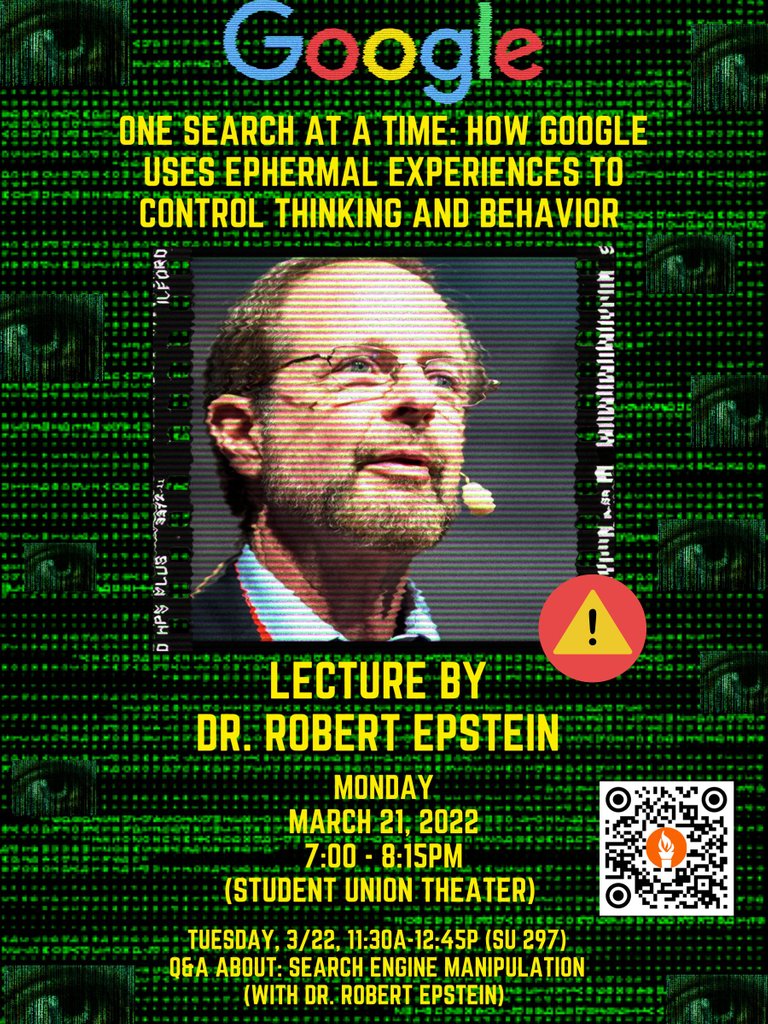One Search at a Time -- How Google Uses Ephemeral Experiences to Control Thinking & Behavior
Lecture by Dr. Robert Epstein
(here is the link to the recorded video)
Sponsored by the Free Enterprise Society at Oklahoma State University.
Monday, March 21, 2022, at 7:00p (CST)

(poster design by @cal.supremacy)
Speaker Bio
Dr. Robert Epstein
ROBERT EPSTEIN is Senior Research Psychologist at the American Institute for Behavioral Research and Technology (AIBRT) and the former editor-in-chief of Psychology Today magazine. A Ph.D. of Harvard University, where he was the last doctoral student of pioneering psychologist B.F. Skinner, Dr. Epstein has published 15 books on artificial intelligence, adolescence, and other topics, as well as more than 300 scientific and popular articles, including scientific reports in Science, Nature, and the Proceedings of the National Academy of Sciences (PNAS).
His 2015 report in PNAS entitled "The Search Engine Manipulation Effect (SEME) and Its Possible Impact on the Outcomes of Elections" has been downloaded or accessed from PNAS's website more than 100,000 times. The report describes one of the largest effects ever discovered in the behavioral sciences, and because SEME is nearly invisible as a source of influence and leaves no paper trail for authorities to follow, it is an especially dangerous form of influence. Dr. Epstein's research suggests that SEME is currently determining the outcomes of upwards of 25 percent of the world's national elections and that it is affecting a wide range of opinions, not just voting preferences. In 2016, Dr. Epstein discovered that the search suggestions we see in Google's "autocomplete" can also be used to shift votes and opinions without people's knowledge - a manipulation he calls the "Search Suggestion Effect" (SSE). He and his research team are currently studying and quantifying seven SEME-like forms of influence that the internet has made possible.
Dr. Epstein has also built the only systems ever deployed to capture the ephemeral content that Big Tech companies use to manipulate opinions and votes and that are normally lost forever. In the days leading up to the 2016 presidential election in the U.S., he preserved 13,207 election-related searches on Google, Bing, and Yahoo, along with the 98,044 web pages to which the search results linked. He found a significant pro-Clinton bias in Google search results (but not in Bing or Yahoo results), sufficient to have convinced between 2.6 and 10.4 million undecided voters to vote for Mrs. Clinton without knowing they had been influenced. Dr. Epstein reported these findings even though he was a Clinton supporter and is not a conservative politically.
In the days leading up to the 2020 Presidential election and the 2021 Senate runoff elections in Georgia, he and his team preserved more than 1.5 million politically-related ephemeral experiences on Google, Bing, Yahoo, YouTube, Facebook and other platforms. Once again, he found extreme political bias on Google and YouTube (which is owned by Google), sufficient to have shifted millions of votes in the Presidential election without people's knowledge. More important, a letter reporting Dr. Epstein's preliminary findings sent to the CEO of Google by three US Senators on November 5, 2020, forced Google to stay out of the Georgia elections. In "Taming Big Tech" and other essays, Dr. Epstein argues that setting up a permanent, large-scale monitoring system like the ones he has implemented is the only effective way to prevent Big Tech companies from undermining our democracy, brainwashing our children, and controlling our minds. His most recent election monitoring findings are summarized in this 15-minute video.
Dr. Epstein's research is featured in an 80-minute film documentary called "The Creepy Line”, which can be viewed here free-of-charge. His 2022 appearance on the Joe Rogan Experience can be viewed here.
In July 2019, Dr. Epstein testified before Congress about his continuing research on online manipulation. His testimony can be viewed here (7-minute video).
A thought leader in the behavioral sciences, Dr. Epstein is typically interviewed by journalists more than 50 times a year. You can learn more about his work at https://aibrt.org or https://drrobertepstein.com. His life and career are reviewed in a 90-minute "STEM Talk" here.
Dr. Epstein is currently raising funds to build a large-scale, permanent monitoring system - one that will protect democracy, free speech, and human autonomy from manipulation by emerging technologies for decades to come. You can support and learn more about his research here.